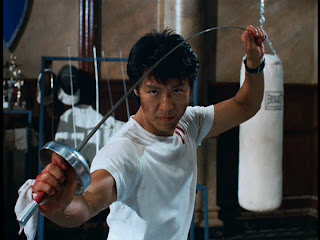Monday, 25 October 2010
Best of the Best 4: Without Warning (1998)
In the fourth and final film in the Best of the Best saga, Tommy Lee (writer/director/producer Phillip Rhee) once again takes center stage. It appears he's given up on the life of a wandering hero since the events of Best of the Best 3: No Turning Back, and in the intervening three years he has gotten married (not to Gina Gershnon), had a daughter, become a widower, and started a new career with the police force as a martial arts instructor. Curiously, his daughter is on the cusp of her sixth birthday, so I guess she's either from a previous marriage or he was totally lying about being single in the previous film.
After promising his daughter a homemade birthday cake, he seeks baking advice from his friendly local convenience store owner Jack. It just so happens that Jack's daughter Mickey (Jill Ritchie, who looked really familiar until I looked her up on imdb and found out she had a minor role on Arrested Development as the Bluth publicist) has been contracted by evil Russian counterfeiters to decrypt a disc containing stolen US Treasury security codes. She has a change of heart and escapes, heading straight to her father's convenience store. She is shot by a couple of thugs, but not before she slips the stolen disc into Tommy's pocket.
So the fourth film in the Best of the Best series shifts into yet another sub-genre, the wrong-place-at-the-wrong-time type Die Hard action thriller. The two main bad guys are a couple of Russian criminals/terrorists. One of them is played by Tobin Bell, back before he was sentenced to appear in Saw films for the rest of his life. They aren't hugely memorable bad guys, but while their master plan isn't particularly complicated (1. Steal codes 2. Print money 3. Profit!) it is needlessly destructive. Just stealing the banknote paper involves shooting everybody in a traffic control center, killing a half-dozen cops and blowing up a railway station. They then carry an armoured truck away with the help of a helicopter and a terrible composite shot. I wouldn't think it'd be that hard for the police to spot a helicopter carrying a 5-ton armoured truck, but somehow they get away clean.
Naturally Tommy can't go to the police because there's a crooked cop involved. Is it the asshole cop Detective Gresko (Ernie Hudson) who insults and belittles his martial arts, or the nice, friendly cop who helps him out at every turn? The answer may surprise you, but if so then you probably shouldn't be watching such violent films since you were clearly born yesterday. Hudson is wasted as Gresko, whose only purpose is to be enough of an unreasonable asshole that the logical solution to Tommy's problems (going to the police) is out of the question. Similarly for Paul Gleeson, who appears as a friendly priest whose only purpose is to babysit Tommy's daughter so she can be kidnapped and held to ransom in the final act of the film.
With every film Tommy appears to be drifting further and further from his no-killing policy. Early in the film he appears to feel mildly guilty after accidentally killing a henchman, but later he takes part in an explosive chase sequence that destroys a fuel tanker, a car, several motorcycles, a helicopter and possibly a segway or two. In the other films he always showed mercy to the main villains - the one time he killed a villain it was in self-defense, and even then it sent him on a cross-country journey of self-discovery - but here he happily kills the two bad guys by tossing a bag full of explosives through the cargo hatch of their plane while it is in mid flight. He's not really setting a good example for his daughter.
Although this is mainly a guns-and-explosions type action film, they still find a few good excuses for kung fu fight scenes. I especially liked the part where he is escaping the bad guy's hideout and randomly wanders into a martial arts class. I've seen this scenario in a few different films (The Man From Hong Kong, Kiss of the Dragon), but I'm surprised it isn't used more often; it's genius in it's simplicity. In this scene we also learn that Tommy Lee is an expert fencer, by which I mean he can handle an épée, not that he's an experienced trader of stolen goods. The action scenes are shot pretty well, although maybe a step down from the previous films in the series.
I don't really have much more to say about this one. There are a few nice touches, like when Tommy is drugged by an evil woman and butterflies start flying around like in a quirky indie comedy, but mostly it's a pretty dry and by-the-numbers action film. It's a shame to end the series this way, especially since it marks the end of Phillip Rhee's film career, but I do respect that each sequel tried to do something completely different. That's becoming increasingly rare these days, when most DTV sequels are simply a case of doing the same thing as the theatrical release, only less.
Subscribe to:
Post Comments (Atom)


No comments:
Post a Comment